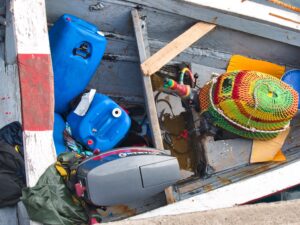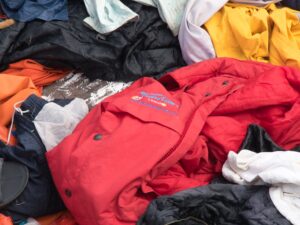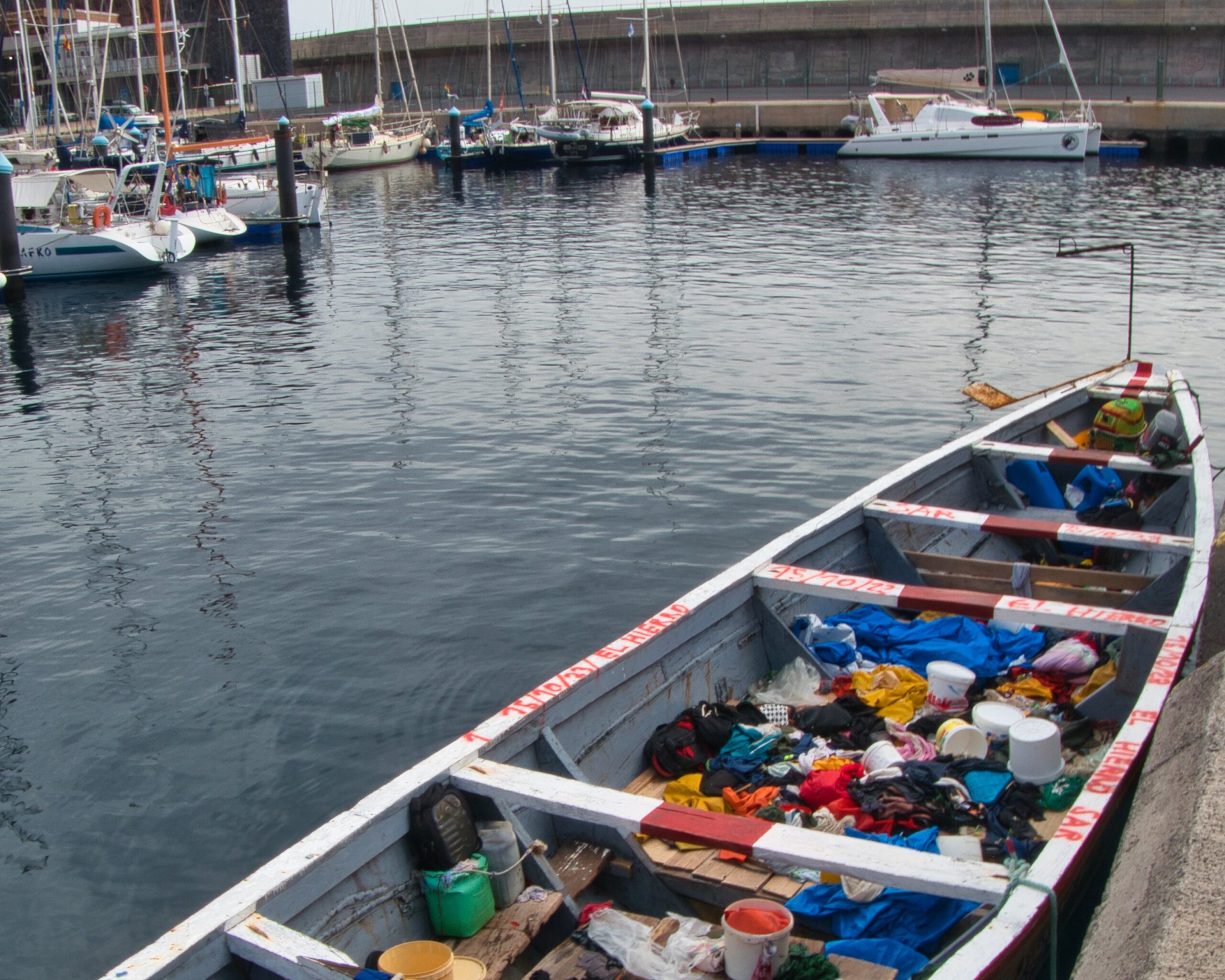In Santa Cruz de Teneriffe, I asked in a chandlery for a courtesy flag for Gambia. The shopkeeper looked at me with a smile and said they didn’t have anything like that. No one would want to go there. I stammered something about future sailing destinations in Africa. But the man just shook his head.
„They come to us. Not the other way round.“
The pirogue on El Hierro
Now I’m in the harbour of El Hierro, the smallest and most south-westerly of the Canary Islands, and a narrow, elongated wooden boat is moored to the quay wall opposite. It’s brightly painted and has a steeply projecting bow. It is a pirogue, a fishing boat typical of West Africa.
Since September, refugee boats have been landing on El Hierro again and again. During the weekend of 14 and 15 October alone, the coast guard rescued over 1000 refugees in 19 boats. And that is still a small number for the whole of the Canary Islands. The refugees had started from different parts of the West African coast, the media said.
The weather situation for a crossing from Africa to the Canary Islands has been favourable for months. The trade wind is weak to non-existent. That prevents us from setting off. The pirogues and inflatable boats of the refugees can take advantage of the unusual weather window.

Die Aussenbordmotoren des Flüchtlingsschiffes.
But what must such a crossing feel like? The inside of the open boat moored in the port of El Hierro is strewn with clothes, handbags, shoes, sandals. The things lie partly covered under blue plastic sheets, under which the travellers have probably sought shelter from the sun and the spray. Several blue water canisters lie empty between the benches. In the back of the boat, probably also empty, yellow jerry cans for the two outboard motors were left behind. One engine is installed in the stern. The other one stands lashed next to it as a reserve.
A gruelling journey
They are disturbing testimonies to days of exertion. Even in calm conditions, the journey across the open sea without decent shelter, without reasonably comfortable places to rest and without even the slightest privacy to attend to one’s needs must have been hell. There were undoubtedly women on board the boats – the handbags testify to this – and children. There were probably also pregnant women and babies among the travellers. How were they cared for? Who helped them if they got seasick – and some were guaranteed to have suffered from seasickness.
We sailors travel comparatively comfortably. I often spend hours stretched out in my bunk, reading, dozing. I listen to the sounds of the sea and the rig and usually have nothing to fear. The water supplies are sufficient, as are the provisions. Once a day at least, I cook something hot.
For the refugees on the pirogues, there will have been nothing warm from the first to the last day of their probably five to seven-day journey. There was water. And what else? What provisions they had probably packed for themselves. It couldn’t have been much. Videos on Spanish television show people who had to be supported by men from the coast guard so that they could climb up the ladders of the quay walls. They lay down exhausted on a concrete threshold. Children had to be carried.
Not welcome
They are not welcome. In Santa Cruz I had a discussion with a man who was ranting about the migrants. The usual tirades, the usual arguments.
I don’t know if there are people from Guinea-Bissau among the refugees. Probably there are, because the country is not exactly known for fulfilling the dreams and hopes of its inhabitants. Perhaps it is different on the Bijagós, the archipelago off the coast that we are travelling to.
There, queens are supposed to rule justly and traditional ways of life are cultivated. But for an obvious reason, our boats are crammed with food, clothes and medical supplies.
We tell ourselves we are on a humanitarian mission. But what kind of image will we give to the people there when we show up with our yachts? I think the way our journeys across the sea differ and the reasons why we set out, we the sailors on the one hand, the refugees on the other, speaks volumes.
Of course, if you really want to travel in comfort, you certainly won’t choose a sailboat as your means of transport. And those who, like me, sail alone are also confronted with one or two challenges. Lack of sleep is one of them and the problem of having too few hands to perform certain tasks optimally. But that’s no comparison with a trip on an overcrowded wooden boat, squeezed shoulder to shoulder on a bench or the floorboards, under which the bilge water sloshes back and forth, with vomit and other things floating in it. All the while, the constant screeching of an outboard motor in your ear, pushing the boat forward against the wind and waves.

Eine rote Skijacke aus Livorno liegt zwischen den Sachen im Flüchtlingsschiff.
In the pirogue on El Hierro I discovered a ski jacket with the inscription „Racing Team Livigno“. I hope the clothes we take to Guinea-Bissau don’t come back this way.

Pingback: Flüchtlinge und Segler – ihre Wege kreuzen sich auf den Kanaren - Meergeschichten
Pingback: To the Cape Verde Islands – or the expansion of the horizon - Meergeschichten